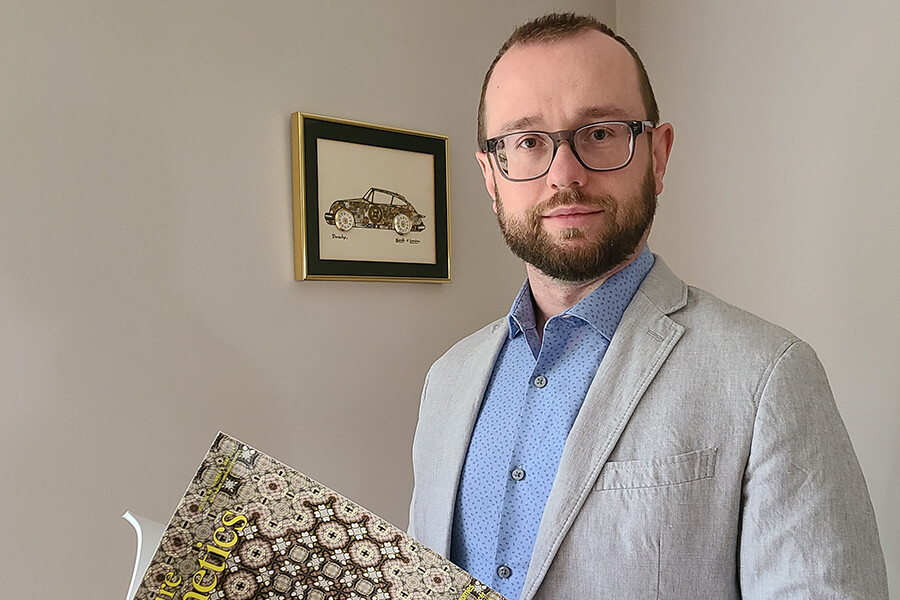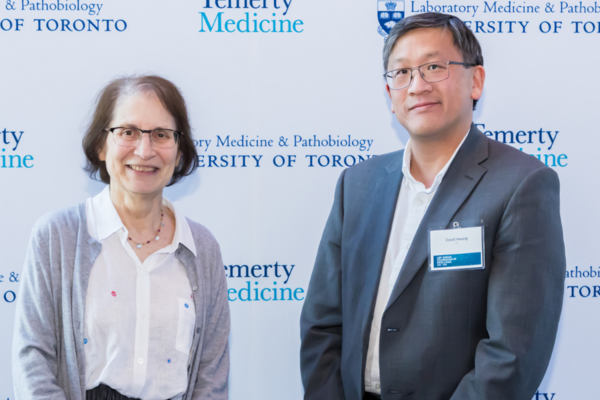LMP alumnus helps establish a software start-up

Dr. Pawel Buczkowicz is Chief Operating Officer and VP Scientific and Medical Affairs at PhenoTips. A precision medicine software startup, they recently raised $2.5 million to take their “world’s first genomic health record” to hospitals and health systems around the world. Pawel credits his PhD in the Department of Laboratory Medicine and Pathobiology at the University of Toronto as “foundational to get me to where I am today”.
Towards the end of his undergraduate degree at Ryerson, he completed several ‘Co-ops’, or paid internships, one of which was in the lab of Dr. Cynthia Hawkins, Professor in LMP and Neuropathologist-Scientist at the Hospital for Sick Children. This exposed him to a world of pathology, genetics and brain tumours which was “A big eye-opener and pointed me towards what I was passionate about.” He joined the Hawkins lab, completing a PhD in 2014 on ‘Comprehensive Integrated Genomic and Histopathological Analysis of Paediatric Diffuse Intrinsic Pontine Glioma’.
“I had a lot of good memories at LMP during my PhD,” says Pawel, “It was a time in my life that shaped my views about a lot of things, especially issues in healthcare. The people at LMP, the strong research focus, the environment, and collaborations with external institutions were a very important part of that”.
He has fond memories of working with specialists working across LMP and SickKids such as Jim Stavropoulos, Michael Taylor, James Rutka, Annie Huang, Gino Somers, and Richard Hegele. His supervisor, Dr Hawkins, was, and still is, a big influence on Pawel – someone who gave him “the right balance of independence and direction and shaped the evidence- and science-based focus of how I approach things today”.
What really made an impression on Pawel was being part of research at LMP and SickKids that had an immediate impact on patient health.
“It’s an incredible feeling when you discover something that nobody else in the world knows at that particular moment. Something that leads to a greater understanding of the human condition and health and disease,” explains Pawel, “But what really gave me an adrenaline rush was getting my first publication acceptance in Nature Genetics, and the subsequent recognition I got for my work.”
His PhD focused on a particular type of brain cancer, Paediatric Diffuse Intrinsic Pontine Glioma (DIPG), and his work resulted in the World Health Organization reclassifying the tumour just two years later. “It’s a very quick timeline for something to move in healthcare and it refocused me to prioritize my work based on the immediacy of their impact on patient care”.
That focus was realized through PhenoTips, a start-up arising from a collaborative research project he was involved in while working at SickKids after his PhD.
Pawel had questions which influenced the development of PhenoTips: “Why is there no standard way of recording clinical data during a patient visit with geneticists? Why are pedigree diagrams (a family tree based on inherited conditions) being drawn using pen and paper? Why do electronic health record systems focus on billing codes rather than on information that would actually help a patient get a diagnosis and treatment?”
He realized, through his experiences at SickKids, that it was hard to find exact information in pathology reports as elements are often unsearchable due to being a scanned PDF, or someone may have misspelled a complicated medical term. This is often compounded in patients’ notes when physicians may record patient symptoms differently.
At PhenoTips they use a variety of natural language processing and other forms of Artificial Intelligence to develop algorithms that can gather data, spot patterns and assess risks.
“We wanted to take a holistic view of the entire rare disease patient journey. Figuring out ways we could involve the patient in collecting their clinical and family history information, streamlining clinical workflows or genetics to allow the clinicians to enter and record standardized clinical terms. We then had to think about how you integrate this software into existing electronic health records systems of hospitals in order to really maximize the efficiency, and minimize duplicate data entry or clerical errors”, explains Pawel, “Providing a complete genomic health record system that can be used across the entire patient journey which could empower doctors with the best quality data that they can have at their fingertips”.
Based on what he learned in his PhD, the bottom line for Pawel is to be able to make fast, impactful change for patients, “This could reduce the amount of time a patient, especially a rare disease patient, needs to wait to get a diagnosis. It also opens up the opportunity to share information about rare or undiagnosed diseases globally in a way that allows new gene disease associations to be discovered sooner”.
LMP provided Pawel with the foundations of scientific knowledge and research experience, but it was more than that: “It exposed me to many different ways of thinking, examining problems and trying to come up with tenable solutions. The experiences I had at LMP in terms of education and research at SickKids set me on a path of trying to have an immediate and positive impact on patient outcomes and streamlining workflows in genetics and healthcare. It’s a primary goal in my professional life”.
He advises current students in LMP to make the most of their time while in the department, pointing out various career seminars and other opportunities across LMP and Temerty Medicine. “It's important to be exposed to as many viewpoints as possible during your time – whether that be related to your current research or exploring different career options.”
Pawel notes that a PhD takes a lot of time and commitment, but a work-life balance is important irrespective of where you are in your career.
“It’s hard,” smiles Pawel, "I know people work really long hours and weekends in the lab but life is short and you need to be able to figure out when to take a step back and not get stuck in that daily grind. I was lucky enough to be able to do my PhD and still have time to enjoy time while I was there”.
Find out more
More on Dr. Cynthia Hawkins. Pathology and precision medicine: how research has transformed brain tumour diagnostics for children
Our research: Artificial Intelligence in Healthcare
The Temerty Centre for Artificial Intelligence Research and Education in Medicine (T-CAIREM) at the University of Toronto



